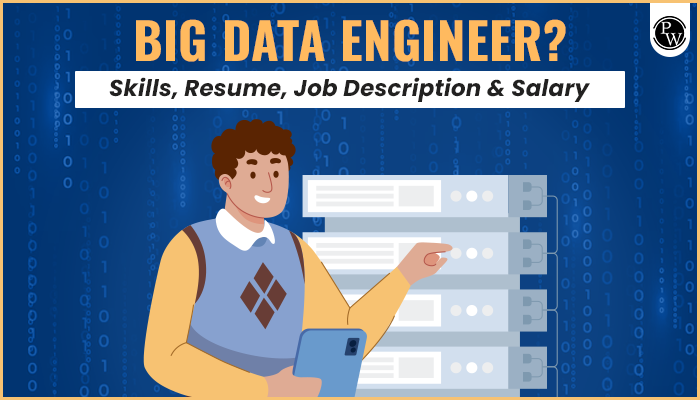Big Data Engineer has a diverse range of responsibilities that they handle daily. These tasks involve working with large-scale computing environments, interacting with huge data processing systems, and managing databases. Their objective is to sift through large amounts of data to identify relevant sets that can be analyzed to predict various behaviors by providing organizations with valuable data analyses.
Big Data Engineers help assess performance, identify market demographics, and predict upcoming changes. The insights generated by Big Data Engineers are applicable and beneficial across multiple industries, such as business, finance, healthcare, science, government, and telecommunications.
Having understood the role of a Big Data Engineer, let’s now explore whether pursuing a career as a Data Engineer is a wise choice and delve into the steps involved in becoming one.
Recommended Course
- Decode DSA with C++
- Full Stack Data Science Pro Course
- Java For Cloud Course
- Full Stack Web Development Course
- Data Analytics Course
How to Become a Big Data Engineer?
Here are seven essential skills for data engineers:
1.SQL (Structured Query Language):
SQL is the foundation of data engineering. Mastering SQL is crucial for managing relational database management systems (RDBMS). It involves more than memorizing queries; you must learn how to optimize them efficiently.
2. Data Warehousing:
Understanding how to build and work with data warehouses is a key skill for data engineers. Data warehousing enables the collection of unstructured data from multiple sources, allowing for comparison and evaluation to enhance business operations.
3. Data Architecture:
Data engineers should possess the knowledge to construct complex database systems for businesses. This skill involves managing data in motion, data at rest, and datasets and understanding the relationships between data-dependent processes and applications.
4. Coding:
Developing programming skills is essential for connecting databases and working with various applications, such as web, mobile, desktop, and IoT. Learning enterprise languages like Java or C# is beneficial, with Python and R being particularly important for data engineering tasks.
5. Operating Systems:
Becoming proficient in operating systems such as UNIX, Linux, Solaris, and Windows is necessary for data engineers to navigate different environments effectively.
6. Apache Hadoop-Based Analytics:
Apache Hadoop is an open-source platform for distributed processing and storage of datasets. Data engineers can use Hadoop, HBase, and MapReduce for various operations, including data processing, access, storage, governance, security, and overall operations.
7. Machine Learning:
Although machine learning is often associated with data science, having a basic understanding of how data can be utilized for statistical analysis and modeling is valuable for data engineers in their job roles.
By acquiring and understanding these essential skills, data engineers can enhance their capabilities and contribute effectively to their organizations.
Job Description of a Big Data Engineer
To truly grasp the significance of a big data engineer’s role, it’s important to understand that big data refers to extensive data collection that regular software solutions struggle to handle. Unlike structured data, which follows a specific format, big data is unstructured and requires the expertise of big data engineers to process effectively.
Big data engineers utilize a range of technical skills to tackle their responsibilities. They function as software developers, Good at coding while possessing the qualities of a skilled data scientist and engineer. They do various tasks on any given day.
Their tasks may involve identifying, extracting, and delivering data in a format others use for evaluation. A big data engineer must ensure the extracted information is valid and reliable throughout this process. This requires a meticulous approach to handling the data.
On any particular day, a big data engineer could be engaged in activities such as working with cloud computing environments, assisting in documenting requirements, resolving any uncertainties in the data, and much more. The scope of their work is broad, reflecting the complex nature of the field.
Salary of a Big Data Engineer
Big Data Engineers earn an average salary of approximately Rs 7,22,000 per year. Junior engineers in this field can expect to earn around Rs 4,50,000 per year, while senior engineers have the potential to earn up to Rs 12,50,000 per year. These figures reflect the industry’s typical salary range for Big Data Engineers.
However, the salary of big data engineers increases with time. Given below is the salary of big data engineers based on their experience.
| Experience | Salary |
| 0-1 years | ₹4,56,000 |
| 1-4 Years | ₹ 7,16,000 |
| 5-9 Years | ₹10,00,000 |
| 10-19 Years | ₹20,00,000 |
Big Data Engineer Resume
When building a resume for a Big Data Engineer, it’s crucial to structure it effectively to capture the attention of recruiters. Here’s a breakdown of how to craft your resume:
1. Contact Information:
Begin with your name and contact details, including phone number and email address.
2. Work Experience:
Start with your relevant work experience, immediately grabbing the recruiter’s attention. Be concise and precise in describing your job responsibilities and the lessons you learned from each role. Include the following details for each experience:
3. Designation
- Organization’s Name
- Employment Duration
- Summary of job responsibilities
- Highlight any specific knowledge or experience gained
- Mention relevant software and framework versions used
- Tailor your experience to match the requirements outlined in the job description, focusing on the tools and skills the company is seeking.
- Technical Expertise:
- Create a separate section to showcase your technical skills after the work experience section. List the skills you consider essential for the Big Data Engineer role and those you are proficient in.
4. Achievements:
Include an “Achievements” section where you highlight relevant accomplishments. Be mindful not to overwhelm the reader with too many achievements. Focus on a few key accomplishments directly relevant to the position and that you are confident discussing.By organizing your resume in this manner, you can present your professional experience, technical expertise, and notable achievements in a clear and impactful way.
How to Prepare for Big Data Engineer Interviews
Big data jobs stand apart from traditional IT professions due to their increased demand for expertise in data analytics and the Hadoop environment. These roles require practical experience with big data technologies, a strong understanding of key concepts, and theoretical knowledge.
To secure these positions, it is essential to undergo relevant training and obtain certifications in the field. When preparing for a big data interview, it is crucial to adopt a step-by-step approach to ensure success. Mastering cracking a big data interview requires careful planning and thorough preparation.
Once you have acquired the required skill set and knowledge of big data tools and technologies, the next crucial step is to prepare effectively for the big day. Here are some important tips to consider:
1. Prepare the Right Questions and Standard Answers:
Invest time in identifying potential interview questions and crafting well-thought-out responses. Research common big data interview questions and Create responses demonstrating your knowledge and problem-solving skills.
2. Practice and Follow-Up:
Practice your interview skills, both in terms of answering questions and presenting your knowledge confidently. Following up with the interviewer after the interview is important to express gratitude and reiterate interest in the position.
3. Get Ready with the Right CV:
Ensure your CV is made specifically for the big data engineering role. When applying for a job, you must showcase your relevant skills, experiences, and achievements that align with the job requirements. This will help increase your chances of being considered for the position. Make it concise, well-structured, and visually appealing.
4. Be Ready to Face Real-Time Problem Scenarios:
Expect that the interview may include real-time problem-solving scenarios related to big data. Familiarize yourself with common big data challenges, and be prepared to demonstrate your analytical thinking and problem-solving skills.
5. Prepare Your Questions for the Interviewer:
Prepare a list of questions to show interest in the role, and helps you gather valuable information about the company and the position’s responsibilities. Following these tips can enhance your preparedness for a big data engineering interview and increase your chances of success.
Frequently Asked Questions
Q1. Enlist skills required to become a successful big data engineer
Ans. If you aspire to become a Big Data Engineer, then you need to inculcate the following skills:
- Analytical Skills
- Statistical Skills
- Machine Learning techniques
- Python
- R
- SQL
Q2. Enlist the top hiring industries for the job role of a big data engineer
Ans. Given below are some of the top industries for the job role of Big Data Engineer:
- Internet of Things (IoT)
- Finance
- Social
- Government and non-profit organization
Q3. What are the key responsibilities of a big data engineer?
Ans. The prime responsibility of a big data engineer is to gather and process the raw data at scale. Big data engineers must design and develop applications using selected tools and frameworks. They need to do the following duties as well:
- Designing big data engineer architecture platform
- Maintenance of the data pipeline
- Modifying and administering integration tools, databases, warehouses, and analytical systems
- Data organization and management
Q4. What is the salary range for a Big Data Engineer in India?
Ans. The average annual salary for this role is ₹8.0 Lakhs, with salaries ranging between ₹3.6 Lakhs to ₹20.4 Lakhs. This information is based on the latest salaries of 4.5k Big Data Engineers.
Q5. As a fresher, can I find a job in Big Data?
Ans. The answer is a resounding YES. In the IT industry, freshers are always in demand, regardless of the technology, whether it’s an old technology like mainframes or a newer one like Big Data.
Recommended Reads
Data Science Interview Questions and Answers
Data Science Internship Programs






